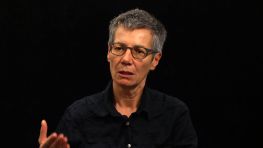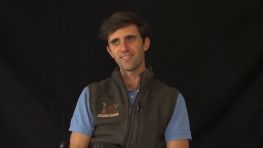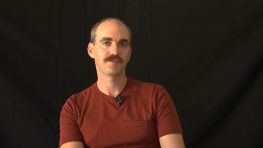 Jocelyne Porcher
Jocelyne Porcher Galdibe Tumal Orto
Bad drought in Kenya
Galdibe Tumal is a herder form Maikona, a small village near the Marsabit National Reserve in northern Kenya, who comes from a family of livestock farmers.
He recalls some of the bad droughts that affected his region over the last century, but says that now things have changed. The rains are diminishing year after year, weakening the flocks, and oil wells are polluting the scarce water resources, poisoning the animals. Many herders are forced to abandon the countryside to move to the cities, where they cannot find work and end up living in absolute poverty and despair.
In his impassioned speech, Tumal launches an appeal calling on indigenous communities and scientists to work together to find a solution. As he says, “crying does nothing, we need to do something so that herders around the world are not forced to become refugees because of climate change.”
Video table of contents
- We have always been a family of herders
- I live in an arid zone
- Bad droughts in the past
- Many goats and camels have died because of drought
- Climate and rain: things are changing now
- Birth of the animals and rainy season
- Herders leave for the city but there is no work
- Livestock diseases
- Oil wells poison the environment for herders and animals
- Sheep, goats, camels and cattle bells
- Cattle bells are rung when a baby is born
- I’m here to defend my animals
- Indigenous people and scientists must work together to find a solution
- Crying does nothing
- Herders will become climate refugees
Interview information
Country: KE
Region: Marsabit County
City: Maikona
Galdibe Tumal Orto
Date of birth: 08-10-1958
City: Maikona (Kenya)
School: High school or Secondary
Profession: Farmer
Languages: Inglese
Document by: Luca Percivalle
Video by: Luca Ghiardo, Luca Percivalle
Created: 16-09-2017
Questo video fa parte del seguente archivio
Terra Madre
Terra Madre
The archive collects the experiences of the world’s various societies, music and traditions of the food community who meet in Turin every two years to share experiences and knowledge. The archive illustrates the lives of farmers, fishermen, breeders, producers who participated in the worldwide network “Terra Madre (Mother Earth”)”. The interviews highlight the connections between traditional products and the place where they live. Research promoted by the University of Gastronomic Sciences and Slow Food.






